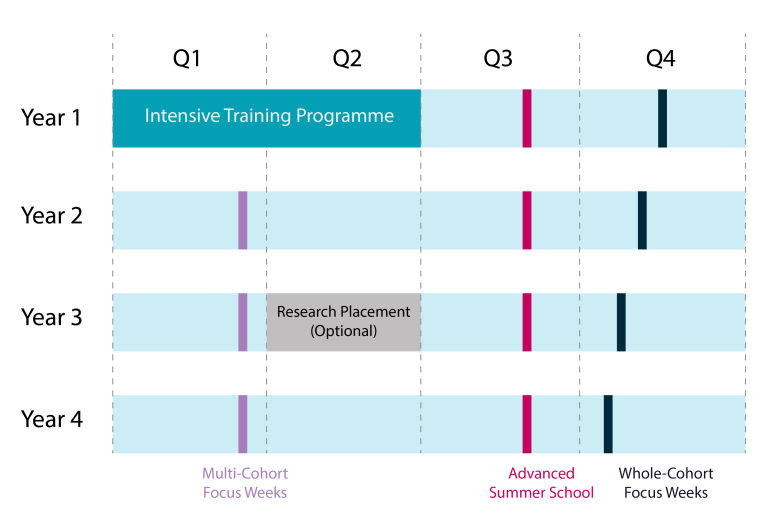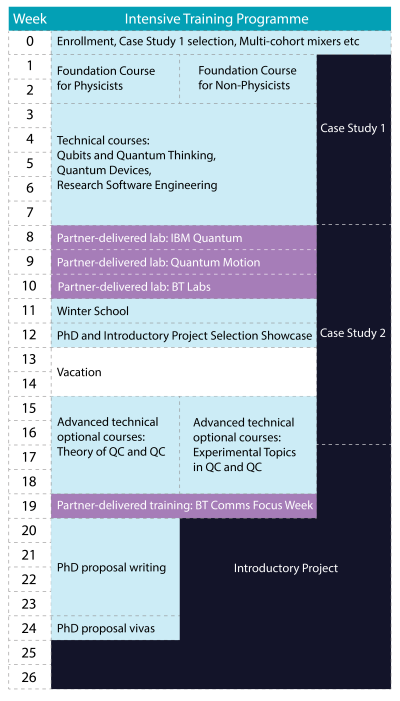How is the programme structured?
The four-year course consists of a 6-month cohort-based intensive training programme (ITP) followed by a 42-month research project phase (RPP) leading to the PhD degree.
The ITP gives a broad overview of all the sub-topics within quantum computation and quantum communications, while the RPP allows specialisation and in-depth focus on a specific experimental or theoretical topic. There is, however, no hard boundary between the phases - there is research activity within the ITP, and cohort-based technical and transferable skills training in the RPP.

A selection of the main events in each student’s four-year training programme. The research project phase (RPP) is shown in teal.
Intensive Training Programme
The ITP gives each student, irrespective of their disciplinary background, a thorough grounding in all experimental and theoretical aspects of quantum computation and quantum communication (qc & qc). The overall aim of the ITP is give the students both a broad awareness of the critical research challenges in the field and the technical skills which will allow them to design and write their own PhD proposals.
This is achieved by a combination of lectures, tutorial classes, seminars, experimental work (including three partner-delivered laboratory weeks), transferable skills training, research case studies and an introductory research project.
All the courses in the ITP are developed explicitly for the programme and will be delivered exclusively to the programme cohorts. Courses are given by members of the supervisory team.

Weekly structure of the intensive training programme. Partner-delivered training is shown in purple.
Foundation Course:
To accommodate the wide variety of academic backgrounds which our students will have the ITP begins with an intensive two-week Foundation Course on topics which each student will not have previously been exposed to. Here the cohort is split into two groups: those with a previous qualification in physics take courses in classical information theory, electrical circuit analysis and semiconductor devices; while those with other entry qualifications take courses in linear algebra, solid state physics and atomic physics. These courses are not assessed.
Partner-Delivered Training:
Each of the three lab exercises in the first term of the ITP will be partner-delivered. IBM will come to UCL to give hands-on training in programming the IBM quantum computer. Our students will have access to silicon quantum-dot qubits at our partners Quantum Motion and will measure single electron effects at milliKelvin temperatures. We will partner with BT Labs on a BB84 quantum key distribution experiment so that our students will appreciate the experimental challenges of implementing quantum communications systems.
Research Case Studies:
Each student undertakes two research case study projects. Students drill down into a detailed research topic by conducting an extensive literature survey and performing a critical analysis of the bottlenecks which much be addressed. Case studies are assessed by written report and oral and poster presentations, giving students feedback on important transferable skills.
Lecture Courses:
Courses will be delivered to all students on Qubits and Quantum Thinking (fundamental quantum information, introductory quantum computing and quantum communications, and open quantum systems); on Quantum Devices, which covers all the hardware platforms for quantum computation (superconductors, semiconductors, neutral atoms, trapped ions and linear optics); and on formal methods of Research Software Engineering (using Python).
Advanced Optional Courses:
In the spring of the first year students take an advanced class in either theoretical or experimental aspects of qc & qc. For the advanced theory strand, we offer "classes to order", whereby students are asked at entry which two or three topics (from a menu of around eight) they would like to study in more detail. The experimental strand will likewise be tailored to student need. In recent years this has included measurements on a superconducting amplifier, a diamond NV-centre qubit and fabrication (in the LCN cleanroom) of a superconducting microwave resonator.
Focus Weeks:
The students will partake in two "focus weeks" in the ITP, allowing them to work in a different environment from the UCL campus. These are the Winter School and the BT Quantum Comms FocusWeek. The former takes place in Cumberland Lodge and consists of visiting seminars given by speakers from the commercial sector coupled with a day of intensive training in public engagement. This training leads into opportunities in the RPP for students to engage more fully in outreach activities through our partnerships with the Orbyts initiative, the Nuffield Research Placements scheme and Quantum City. The BT Quantum Comms FocusWeek consists of seminars on quantum comms at UCL and then site visits to both BT Labs in Martlesham and quantum tech companies in East Anglia (including our partners at Toshiba).
Introductory Project:
Towards the end of the ITP the students begin the transition to their PhD projects. They will undertake an introductory project of ten weeks’ duration. These projects are defined by the UCL supervisory team and must have a goal which is novel and publishable. We anticipate that most students will select an introductory project which is closely related to the topic of their PhD research. Some however will use this as an opportunity to do research in a neighbouring topic, an approach which we encourage where appropriate.
Student PhD Proposal:
The introductory project takes place in parallel with arguably the most important activity in the ITP: each student writes their own PhD proposal. By this time students in the general track will have a clear overview of the field and know which topics excite them most. They will also have the technical skills to enable them to identify the critical challenges in the international research agenda which their research will address. Students who are already committed to a specific industrially co-sponsored project will also write their own PhD proposal, going into details of the project planning, execution and risk mitigation in exactly the same way as the general track students.
Each proposal is assessed at a viva conducted by two academics who are not part of that student’s supervisory team. The assessors ensure that the research topic is within remit, that successful execution of the plan will lead to novel publishable work, that the plan is realistic in terms of timescale and resources, and that suitable risk mitigations are in place.
Research Seminars:
Seminars given by UCL academic staff take place every week during the ITP, giving students an overview of all the research undertaken on campus. This is also an opportunity to network with potential PhD supervisors. In addition to these staff-delivered seminars, every two weeks there is a multi-cohort Quantum Club gathering at which two seminars are given by RPP students.
Research Project Phase
The primary activity in the RPP is a programme of novel experimental and/or theoretical research leading to publications in peer-reviewed journals, international conference presentations and ultimately a PhD dissertation which will be defended in a viva examination with two established intellectual leaders in quantum computation or quantum communications.
At this level, the RPP is no different from any other PhD at UCL. The intra- and inter-cohort activities which the programme will organise during the RPP, however, will give our students additional skills, experiences and contacts which will maximise the impact and effectiveness of their PhD work and prepare them in a targeted way for a future career in the quantum workplace.
 Close
Close

